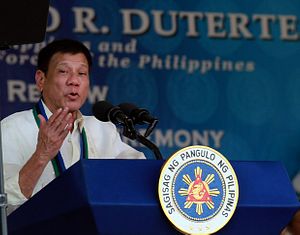There may come a day when Philippine President Rodrigo Duterte is brought before the International Criminal Court to answer questions about his “war on drugs.” We might have moved one step closer to that end after UN human rights experts this month called on the United Nations to launch an independent investigation into Duterte’s signature policy.
“We are extremely concerned over the high number of killings which are being carried out across the country in an apparent climate of official, institutional impunity,” the experts stated in their report. The Philippine government says 5,000 people have been killed in drug-war operations since Duterte took office in 2016. Human rights groups say there have been between 20,000 and 30,000 murders.
But amid the focus on the headlines of drug wars – not just in the Philippines but in Asia more broadly – it is also worth asking broader questions about their effectiveness. Put more bluntly, do these drug wars actually achieve anything?
While it may be difficult to answer this question definitively, there is evidence out there that can offer a partial response. For instance, in a report published in February, “10 years of drug policy in Asia: How far have we come?”, the International Drug Policy Consortium (IDPC) basically concluded that there was not a whole lot to show for these policies. Jose Ramos-Horta, a former Timor-Leste president and now a member of the Global Commission on Drug Policy, wrote about continuing with the policy of a “war on drugs”:
Staying the course would signal that governments accept that the numbers of people killed on the basis of mere suspicion, and with outright impunity (over 20,000 in the last two years), detained in the name of drug rehabilitation (over 300,000 people throughout Asia), and held in exceedingly overcrowded prisons (where typically at least 50% of a country’s prison population are held for drug offenses) will continue their inexorable rise.
There is also compelling evidence to suggest that government use of drug wars is rooted less in their effectiveness on their own terms and more in broader mobilization efforts to secure political ends. For instance, in Hello, Shadowlands: Inside the Meth Fiefdoms, Rebel Hideouts and Bomb-Scarred Party Towns of Southeast Asia, a book about the regional drug trade, Patrick Winn notes that Duterte’s war on drugs is a moral fight against a social menace, and one in which the means justify the ends irrespective of effectiveness.
But treating drug wars as simply tools for political mobilization is likely to prove ineffective as the approach does not address the underlying socioeconomic issues that drive drug use in the first place. And that is where it becomes clear that irrespective of whatever drug war is waged, absent any systematic and structural reform, these problem will likely continue to remain.
Failure to address those underlying issues will mean that the drug problem will continue to remain for the region, with all its dire effects. Drug-related issues continue to be the subject of occasional headlines in Southeast Asian countries where capital punishment is still in place, including Malaysia, Indonesia, Singapore, Thailand, and Vietnam. In some of these countries, the prison population has been increasing as these drug wars have been waged. Cambodia, for example, saw its prison population balloon since it began its minor drug war in 2017, when the prison population rose by 30 percent. And police and political corruption remains rampant in several Southeast Asian countries as well.
All this points to a grim reality: wars against drugs may be winning political campaigns, but they are losing socioeconomic battles. If governments are truly interested in rooting out drug problems, they need to engage in a comprehensive approach that actually addresses underlying substantive issues, rather than knee-jerk wars that make for good headlines.

































